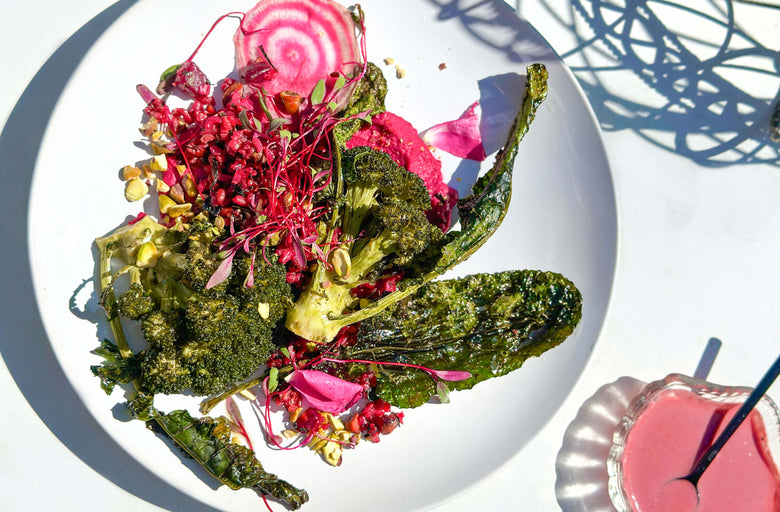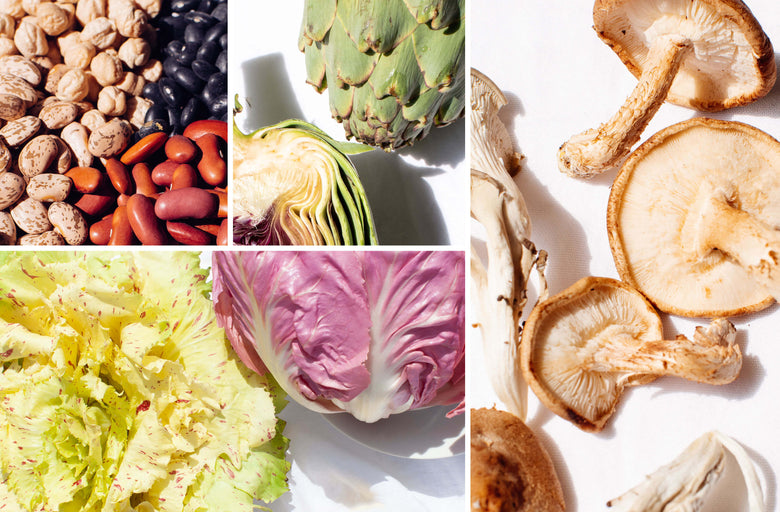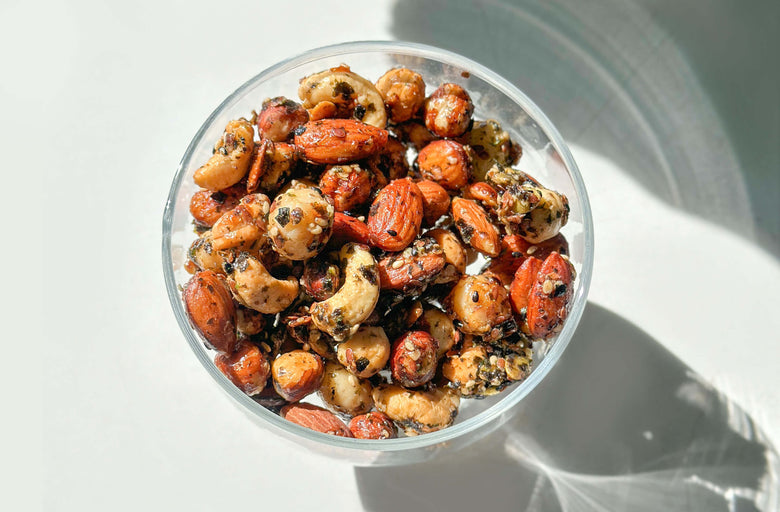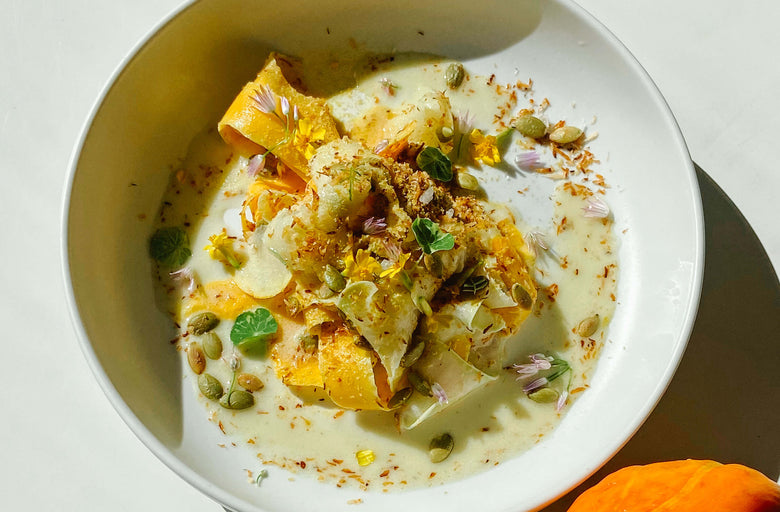Sometimes we make big (albeit, imaginary) plans to escape the hustle of the city and exchange our Metrocards for the come-when-you-can, slowed down, one with the land lifestyle. Even though we have yet to sow our oats out in the wild, Frank of Bhumi Farms certainly has—by planting his own, organic ones in the picturesque East Hampton. Though he won't admit it, his altruism knew no bounds when he traded his Wall Street suit for jeans and a straw farmer's hat to make clean, organic produce and teach others the value of knowing their food's source. It's clear Frank—or Farmer Frank, as he's lovingly called by locals— has found his passion through connecting to nature, educating others, and being a voice for sustainable farming. See below as he waxes poetic on life lessons learned on the farm, how vegetables nourish the soul, and that eating living foods just, honestly, makes the most sense.
We know you worked in NYC on Wall Street for part of your life, what was it that brought you to the Hamptons, to farming and to this specific plot of land?
The Hamptons are beautiful, and there is a magic to it, being sandwiched between the ocean and the bay. Perhaps that's why artists are drawn to it. The rich agrarian culture was also attractive to me. But from a more personal and pragmatic level, there's some nostalgia here from taking family day trips to Montauk as a child and also from not removing myself too far from NYC if my plan to be a farmer completely flopped.

What are some fruits/vegetables/herbs/flower
I'm a vegetable farmer currently, but down the road I hope to grow berries.
This is still really new to me, so I get excited to grow everything still. I get more pleasure at seeing my customers get excited. The best scenario is that I have a great harvest that people really love. Sugar snaps, sungolds, cucumbers and watermelon come to mind.
How did you realize your passion for farming and plants in general?
This is a dynamic life, including discovering what my passion fully is and why I began farming. I just don't believe in a beginning and an end the way we were taught as kids. I don't think it's a passion for farming, I think it's a passion for what farming represents. I mean watching a vegetable grow is super inspiring, you can't help but feel connected to the Earth and everything around you when you farm. That's something I found hard to find in the city... farming was a way to physically see connection.
What are some of the biggest learning lessons you've gained in the past few years being a farmer at Bhumi?
Patience. Acceptance. Humbleness. Synergy. I've learned these lessons, and also learned the balance of inserting myself into the growing process and standing back and letting it happen. That's the art of it, and it conflicts strongly with the science of farming as taught by conventional farming.

What prompted you to turn Bhumi Farms into a totally donor-based/not-for-profit enterprise this year?
Best case is that people are generous and good and would happily take care of their brothers and sisters. In the modern world this has to be packaged with convenience, not unlike Sakara. People know what optimal is, but often convenience takes priority. By taking donations, rather than selling food, we are able to give food away for free, and still operate our farm. We basically eliminated all of our revenue sources overnight and hope to replace them with donations.
What is the one star ingredient that deserves the spotlight and most attention of any farm?
I think soil is the main protagonist and needs to be the heart of every conversation. The perfect vegetable is one that nourishes, not one that looks great, and this can't be accomplished without healthy, living, complex, energetic soil.
What are somethings that people would be surprised to learn about farming and produce in general?
The first thing to agree on is that food is meant to be nourishment, and that food can do good just as it can do harm. If you don't believe in this, then this won't matter.
If we agree, then ask where do the minerals our bodies need to perform come from. Plants do not create minerals, they take them from the soil. So if someone says kale is mineral rich, this may or may not be true, depending entirely on how it was grown.
I think people would be more surprised by what others are allowed to do than what I'm doing. We don't use slaughter house byproducts on our field (blood and bone meal are very common soil amendments on organic farm despite the cows being factory farmed), we don't plant into plastic (farms plant into plastic to help with weed suppression), we don't spray copper (copper is used as a fungicide). These practices follow the letter of the law, but in our opinion, do not follow the spirit of the law.

Is there anything that we as consumers can do to help support the local 'farm to table' movement and get our grocery stores to offer more local produce?
I'd say ask a ton of questions, and respect the potential a well-grown vegetable offers. And then, pass it on.
We know that mineral deficient soil has become such a problem. Can you tell us a few things you do to re-mineralize the soil to make sure your crops are nutrient packed?
Well, it helps to know that plants don't create minerals. Plants take minerals from the soil. So every time you grow a fruit and you take that fruit off the field, you take minerals off the field. So knowing that, you have to replace it. Most conventional farming does not replace it. All they use is NPK. That's the big three. That's nitrogen, potassium, phosphorus. That drives the growth, but it doesn't drive the nourishment of that growth, so you have to add everything else. Plants need 17 essential nutrients, humans need 16. So, what we do here is we test the soil, which is so easy to do, but we also invest in the soil. You can get minerals from all different ways. You can use sea water, if you dilute it enough. We use rock dusts. I feel like there are certain fruits and vegetables that when you have a fresh one, versus a store bought one. Like say for a tomato. A lot of tomatoes that you get at the grocery store are so flavorless, and then you grow them it's so different. That's when you're like, this is what a tomato tastes like.

Can you explain further when you were speaking on using probiotics in your soil?
The soil is alive, just like your gut. So just like kombucha, or yogurt or lactofermented products you put into your belly, we do the same for our soil. It assists with the transference of nutrition from soil to plant. A dead soil is growing styrofoam.
Any plants/herbs that would be easy for people to grow in a small spaces and/or indoors?
So many vegetables are easy to grow. If that wasn't the case, I would be in real trouble. I started a farm with zero growing experience. Great things to grow are salad greens, cherry tomatoes, basil.

Where do you see Bhumi Farms being in five years?
Truth is, not sure. I have some lofty plans that revolve around elevating social consciousness as it pertains to food, and helping those that can't afford the produce we grow.
Create your dream meal using only (or mostly) stuff you grow on your farm:
Oh man. Of all the questions, this is the hardest. I love eating my veggies. Mixed green salad, roasted vegetable hash, a whole grain, topped with a lemony tahini dressing.






